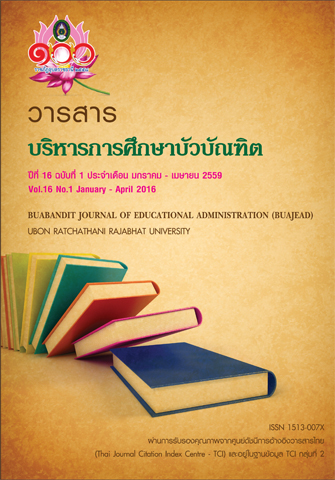การบริหารโรงเรียนตามหลักธรรมาภิบาลของผู้บริหารสถานศึกษา สังกัดสำนักงานเขตพื้นที่การศึกษาประถมศึกษาอุบลราชธานี เขต 4
Main Article Content
บทคัดย่อ
ผลการวิจัย พบว่า
1. ครูมีความคิดเห็นต่อการบริหารโรงเรียนตามหลักธรรมาภิบาลของผู้บริหารสถานศึกษาในภาพรวมอยู่ในระดับมาก เมื่อพิจารณาเปนรายด้าน พบว่า อยู่ในระดับมากทุกดาน โดยหลักคุณธรรมอยู่ในลำดับแรกรองลงมาคือ หลักนิติธรรม หลักความรับผิดชอบหลักความโปร่งใส หลักความมีส่วนร่วม ส่วนหลักความคุ้มค่า อยู่ในลำดับสุดท้าย
2. ผลการเปรียบเทียบความคิดเห็นการบริหารโรงเรียนตามหลักธรรมาภิบาลของผู้บริหารสถานศึกษา จำแนกตามขนาดของโรงเรียนและวุฒิการศึกษา พบวา ในภาพรวมและรายด้านไม่แตกต่างกัน
3. ข้าราชการครูได้เสนอปัญหาและแนวทางการพัฒนาโรงเรียนตามหลักธรรมาภิบาล ดังนี้
3.1 ด้านหลักนิติธรรม บุคลากรยังไม่ทราบข้อบังคับ ระเบียบ และคำสั่งต่าง ๆ เกี่ยวกับการบริหารงานเท่าที่ควร ผู้บริหารควรอบรมให้บุคลากรได้ทราบในข้อบังคับ ระเบียบ คำสั่งต่าง ๆ เกี่ยวกับการบริหารงานเพื่อให้การบริหารงานเป็นไปในทิศทางเดียวกัน
3.2 ด้านหลักคุณธรรม บุคลากรบางส่วนยังเห็นแก่ประโยชน์ส่วนตนมากกว่าประโยชน์ส่วนรวม ผู้บริหารควรสร้างทัศนคติด้านคุณธรรมและจริยธรรมให้เกิดขึ้นแก่บุคลากร ส่งเสริมให้บุคลากรเห็นแก่ประโยชน์ส่วนรวมมากกว่าประโยชน์ส่วนตน มีจิตสาธารณะ
3.3 ด้านหลักความโปร่งใส การบริหารงานไม่มีความชัดเจนในเรื่องของงบประมาณที่นำไปใช้ การเผยแพร่ข้อมูลข่าวสารน้อย ผู้บริหารควรเปิดเผยการใช้จ่ายงบประมาณให้มีความชัดเจนและกระบวนการบริหารงานนั้นพร้อมที่จะตรวจสอบได้
3.4 ด้านหลักการมีส่วนร่วม การทำงานในบางเรื่องไม่ค่อยเปิดโอกาสให้บุคลากรมีส่วนร่วมผู้บริหารควรเปิดโอกาสให้ทุกภาคส่วนเข้ามามีส่วนร่วมในการบริหารงานเพื่อให้การบริหารงานมีความชัดเจนและมีประสิทธิภาพมากยิ่งขึ้น
3.5 ด้านหลักความรับผิดชอบ บุคลากรบางส่วนปฏิบัติงานตามความรู้สึกของตนเองโดยไม่มีความรับผิดชอบต่อหน้าที่ การปฏิบัติงานล่าช้าขาดความรับผิดชอบต่อหน่วยงาน ผู้บริหารควรสนับสนุนการปฏิบัติงานของบุคลากรให้มีความรับผิดชอบและเอาใส่ต่อการทำงานอย่างเต็มที่
3.6 ด้านหลักความคุ้มค่า บุคลากรบางส่วนขาดจิตสำนึกต่อการใช้วัสดุอุปกรณ์อย่างประหยัดและคุ้มค่า ผู้บริหารควรจัดสรรงบประมาณและส่งเสริมให้มีการใช้ทรัพยากรอย่างคุ้มค่าเกิดประโยชน์มากที่สุด
A School Administration according to the Good Governance of the School Administrators under Ubon Ratchathani Educational Service Area 4
The research aimed to study and compare the opinion concerning the school administration according to the good governance of the school administrators under Ubon Ratchthani Educational Service Area 4 as classified by the school size and the educational qualification of the subjects, and to study the problems and guidelines in developing the schools according to the good governance.
The samples used in the research were 302 teachers who taught at the schools under Ubon Ratchathani Educational Service Area 4, derived by a stratified random sampling. The sample size was determined by Krejcie and Morgan’s table. The research questionnaire was a five-rating scale with a confidence value equivalent to .983. Statistics used were percentage, mean, standard deviation, t-test and one way variance analysis.
The research findings were as follows:
1. The opinion of the teachers in the study towards the school administration according to the good governance was in an agreement level. Considering individual aspects, it was found that all were in an agreement level. Top on the list were the principles of virtues, followed by the legality, accountability, transparency, participation, and worthiness.
2. By comparing the opinion on the school administration according to the good governance of the school administrators as classified by the school size and the educational qualification, it was found that there was no difference.
3. The following were the recommendations for the development according to the good governance.
3.1 Legality: the personnel apparently do not know the rules, regulations and orders on the administration. They should be trained and taught in these rules and regulations.
3.2 Virtues: some personnel prioritize their own interest before the common interest. They should be taught morality. In other words, they should be trained and taught to think otherwise.
3.3 Transparency : administration is not transparent regarding the budget spending. The administrators should be more open regarding the budget spending. They should be ready for an official inspection.
3.4 Participation: personnel were not allowed to fully participate in some works. For the work to be more efficient, participation should be allowed.
3.5 Accountability: some personnel performed according to their own feelings without feeling responsible for their duty. In addition, some were slow to conduct their given tasks and irresponsible for their respective agencies. They should be encouraged to be more responsible and devote themselves to the assigned tasks.
3.6 Worthiness: some personnel used the equipments and materials in a wasteful manner. The administrators should allocate a budget cleverly and encourage the personnel to use the resources to a maximum benefit.

